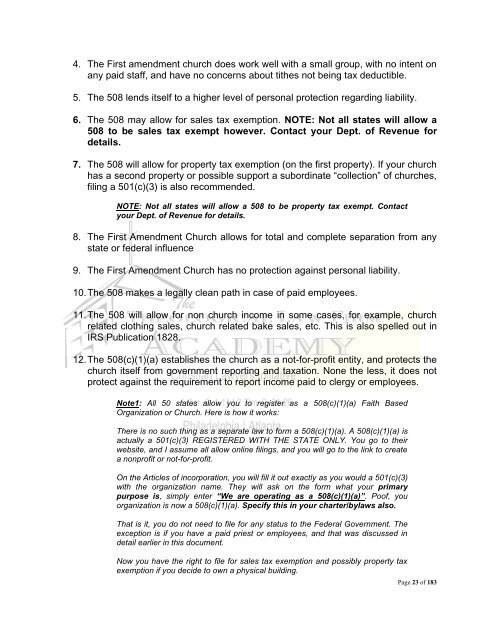The 508(c)(1)(a) Initiative Workshop
The 508(c)(1)(a) Initiative Workshop
The 508(c)(1)(a) Initiative Workshop
You also want an ePaper? Increase the reach of your titles
YUMPU automatically turns print PDFs into web optimized ePapers that Google loves.
4. <strong>The</strong> First amendment church does work well with a small group, with no intent on<br />
any paid staff, and have no concerns about tithes not being tax deductible.<br />
5. <strong>The</strong> <strong>508</strong> lends itself to a higher level of personal protection regarding liability.<br />
6. <strong>The</strong> <strong>508</strong> may allow for sales tax exemption. NOTE: Not all states will allow a<br />
<strong>508</strong> to be sales tax exempt however. Contact your Dept. of Revenue for<br />
details.<br />
7. <strong>The</strong> <strong>508</strong> will allow for property tax exemption (on the first property). If your church<br />
has a second property or possible support a subordinate “collection” of churches,<br />
filing a 501(c)(3) is also recommended.<br />
NOTE: Not all states will allow a <strong>508</strong> to be property tax exempt. Contact<br />
your Dept. of Revenue for details.<br />
8. <strong>The</strong> First Amendment Church allows for total and complete separation from any<br />
state or federal influence<br />
9. <strong>The</strong> First Amendment Church has no protection against personal liability.<br />
10. <strong>The</strong> <strong>508</strong> makes a legally clean path in case of paid employees.<br />
11. <strong>The</strong> <strong>508</strong> will allow for non church income in some cases, for example, church<br />
related clothing sales, church related bake sales, etc. This is also spelled out in<br />
IRS Publication 1828.<br />
12. <strong>The</strong> <strong>508</strong>(c)(1)(a) establishes the church as a not-for-profit entity, and protects the<br />
church itself from government reporting and taxation. None the less, it does not<br />
protect against the requirement to report income paid to clergy or employees.<br />
Note1: All 50 states allow you to register as a <strong>508</strong>(c)(1)(a) Faith Based<br />
Organization or Church. Here is how it works:<br />
<strong>The</strong>re is no such thing as a separate law to form a <strong>508</strong>(c)(1)(a). A <strong>508</strong>(c)(1)(a) is<br />
actually a 501(c)(3) REGISTERED WITH THE STATE ONLY. You go to their<br />
website, and I assume all allow online filings, and you will go to the link to create<br />
a nonprofit or not-for-profit.<br />
On the Articles of incorporation, you will fill it out exactly as you would a 501(c)(3)<br />
with the organization name. <strong>The</strong>y will ask on the form what your primary<br />
purpose is, simply enter “We are operating as a <strong>508</strong>(c)(1)(a)”. Poof, you<br />
organization is now a <strong>508</strong>(c)(1)(a). Specify this in your charter/bylaws also.<br />
That is it, you do not need to file for any status to the Federal Government. <strong>The</strong><br />
exception is if you have a paid priest or employees, and that was discussed in<br />
detail earlier in this document.<br />
Now you have the right to file for sales tax exemption and possibly property tax<br />
exemption if you decide to own a physical building.<br />
Page 23 of 183
















